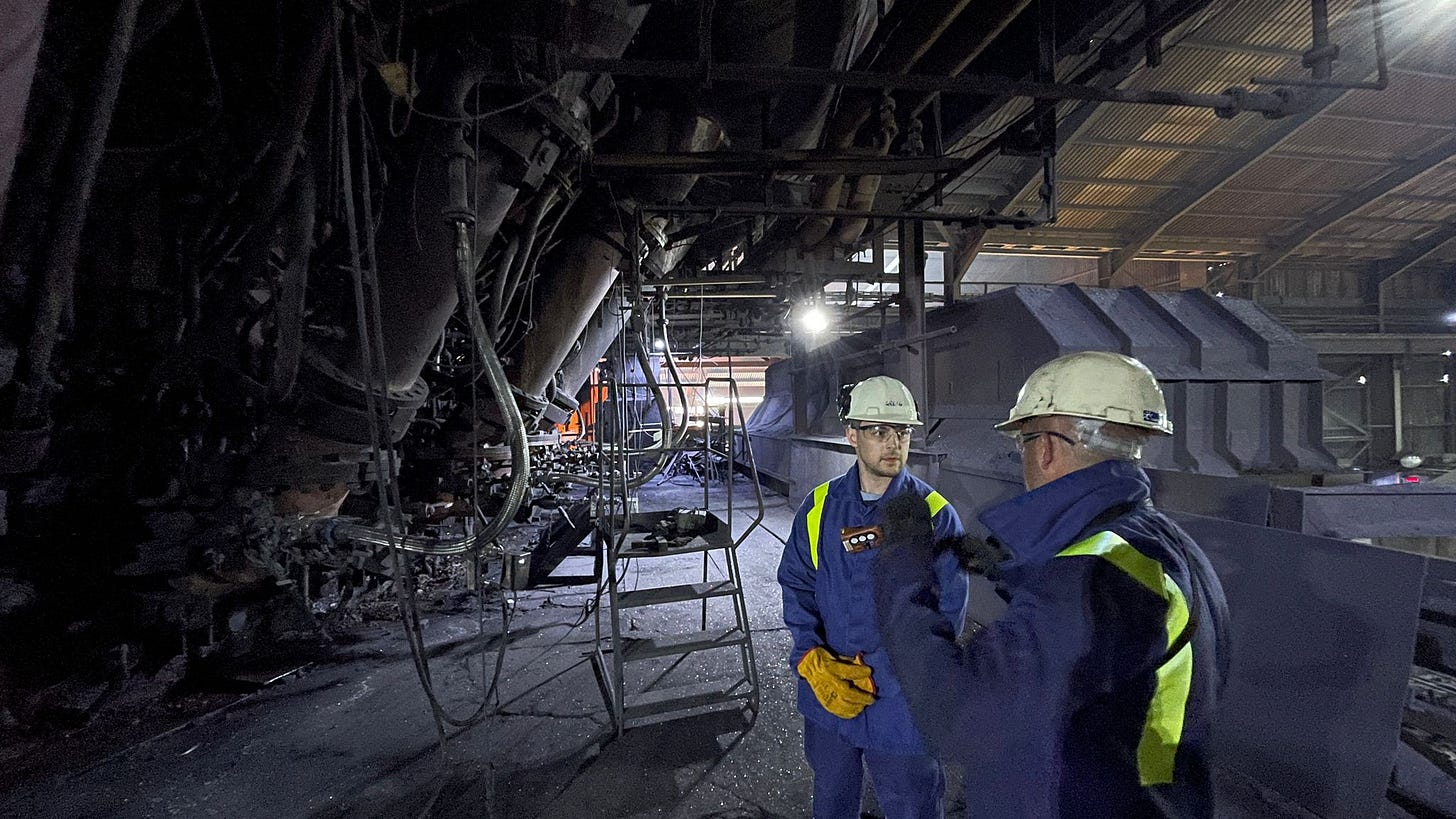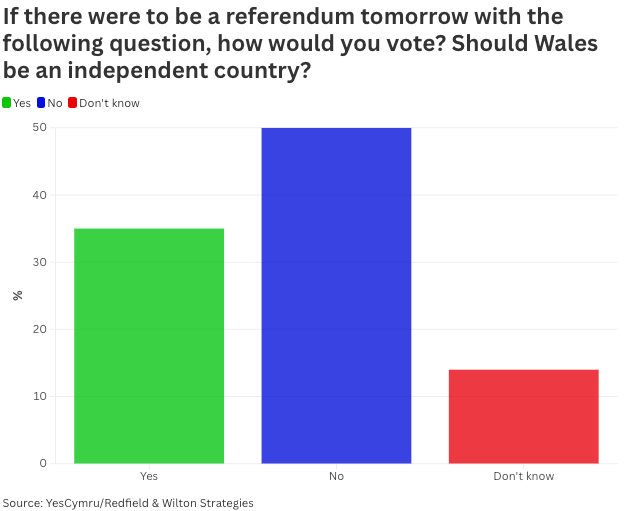Who wants Welsh independence?
Plus a deep-dive into the timebomb currently ticking within Welsh society
Good morning and welcome to another newsletter,
Welcome to all those who have joined after my last Guardian article. Great to have you on board.
It is recess in the Senedd this week which gives us an opportunity to dive into issues we don’t normally get to cover. We will start by looking at how unpaid carers are vital in combating Wales’ age timebomb but how legislation meant to support them is falling short.
Then we will deep-dive into some really interesting polling into how people in Wales feel about Cymru becoming independent.
We will then finish with looking at how the issue of pavement parking illustrates how complex it can be for governments to make a difference (I promise this is more interesting than it sounds).
Before we start, a word from our sponsor:
This newsletter is sponsored by Hello Starling. A proudly Welsh company, Hello Starling plan and buy media, backed by data, which is designed to get maximum attention and measurable results. They specialise in getting eyes on your organisation, product and website. If you are looking to get a return on investment, a change in perception, more visitors, more subscriptions, a bigger audience or a happier audience, I highly recommend you check them out here. In doing so you help support this newsletter.
Why nationalise steel in Scunthorpe but not Port Talbot?
This is a late addition to the newsletter because the news broke after I had written and scheduled it.
My initial reaction was one of anger that Wales apparently had been treated as less important than England. However I am going to hold off on any analysis because I want to make sure I fully understand the decision before commenting further.
I will therefore just leave you with the comment I got from the UK Government when I approached them about they apparent inconsistency in treatment yesterday afternoon. They said: "We’d point you towards comments Minister Jones said this morning".
Minister Jones had said:
“When we came in, there was a deal on the table with Tata Steel to transform that site into an electric arc furnace. We negotiated a better deal and now they are investing over £1bn in that site which will secure 5,000 jobs. We don’t have that option with British Steel. So we’re in a different situation. We’re also at a point where these are our last blast furnaces in the country. We need to ensure we can protect our manufacturing here in the UK, particularly steel which is foundational for much of the growth we want to see.”

Why don’t we care about those who care?
We need to talk about the terrible situation for unpaid carers in Wales. An “unpaid carer” is someone who provides unpaid support and care for one (or more) people who are ill; have a disability; are vulnerable; have a mental health condition; have an active addiction; or are older.
Put simply, we need to be better at supporting these people. It goes without saying that we should do this because it is the right thing to do from a moral perspective, however, it is also vital for the future functioning of our society.
Here are some stats about how Wales’ demographics are going to change:
By 2040 (just 15 years) a quarter of people will be over 65.
By 2040 the number of people over 90 will double.
By 2045 (20 years) the number of people in Wales over 65 will rise 7x faster than the number of working age people.
By 2045 the number of people with dementia will be up by 70%.
By 2045 we will need 40k more social care staff and 20k more care home beds.
You think health and social care is challenging now? This is just the small prawn cocktail starter ahead of the huge hog roast of issues we are going to digest by the time people being born now enter the workforce.
Unpaid carers are the absolute vital heroes we need if we are going to have any chance of managing this looming crisis. They are already preventing the system from collapsing.
Research shows that unpaid carers save Wales £10.6 billion over a 12 month period. For context, the entire annual budget of the Welsh NHS for 2024-25 was £11.3 billion.
Unpaid carers are a godsend for policy makers. Just providing them with a little support is one of the best returns on investment our society can realise in the coming years.
As is so often the case in Wales, we talk a good game when it comes to supporting unpaid carers. But scratch beneath the surface and you see that these words are just that - words.
What a mess
On paper things are pretty good in terms of what the state does for unpaid carers. Back in 2014 the Social Services and Well-being (Wales) Act came into force.
This was wide ranging but the bit I want to focus on is “the right to an assessment”. This means that for all unpaid carers the local authority must offer them a carers’ needs assessment. This assessment is to find out what support a person needs and how the local authority can help them if they do need support.
Interestingly, it also placed a duty on local authorities to proactively identify people who are unpaid carers. This element is really important because there are over 310k carers in Wales that we know of, but many people providing care don’t realise that they are “unpaid carers” (the true figure is likely to be about 450k which is almost 15% of the Welsh population).
This act sounds good doesn’t it? Councils have a legal duty to find carers and assess their needs. Not a bad bit of policy making. Except that many of them are, seemingly, failing to do this.
The charity Carers Wales submitted a freedom of information (FoI) request to all Welsh local authorities asking how many assessments they had carried out on unpaid carers last year. The response illustrates a complex, administrative nightmare of support for unpaid carers in Wales.
For one thing, five local authorities (Bridgend, Caperhilly, Anglesey, Neath Port Talbot & Powys) didn’t even bother to respond.
Of those that did, it was obvious that practice varies widely. Some said they were unable to say because they conflate them with other assessments of people needing care whereas others were able to give a comprehensive breakdown of exactly how many they conducted. If this can’t be measured how can it possibly be managed?
Overall, the figures are below what you would hope for. Take Cardiff. They have just under 29,000 carers according to the census and they completed under 500 assessments. That is just 1.7% of the carer population. Obviously not all may need an assessment but it is still a tiny number given that carers’ circumstances can often change year to year. I don’t think you can make the case that the act is functioning as it was supposed to (remember councils should be proactively finding and identifying carers).
Now I am not singling out Cardiff as particularly bad, it’s not. There were plenty worse. In the whole Merthyr Council area there were only 13 assessments carried out.
When I contacted Merthyr about their low figure a spokeswoman said:
“Since 2021 there has been a year-on-year increase in the number of carers taking up the offer of assessment. We are working with performance colleagues to ensure the accuracy of the data we provide, especially around carers assessments.
“We have recently recruited a carers post to assist in this work and young carers services have been brought back in-house to enable more robust tracking of data in this area moving forward.
“However, we recognise we have a low uptake of carers assessments undertaken and have been reviewing the reasons for this by recording when an offer of assessment is made.”
They added that some people didn’t want an assessment because they felt their views had already been taken into account and that to increase the uptake of carers assessments, they have appointed a carers officer who has been working with unpaid carers through drop ins at a town centre hub.
Research by Carers Wales found across Wales:
30% of carers hadn't even heard of Carer's Needs Assessments until they completed the survey
Less than half of all carers (43%) had even had an assessment since the Act came into force in 2016
Local authorities were also asked in the FoIs “how many full time equivalent posts were available and able to undertake Carers Needs Assessments?”.
Cardiff Council responded to this question saying:
“There were 6 full time posts funded and available, but due to a considerable amount of sickness, and some people leaving the local authority some posts were not filled through the year. 3 staff members were available all through the year, 2 staff members were only part of the year and 1 post was not filled.”
Take a moment to think back to the figures I mentioned at the start of the newsletter. Within a matter of decades those people in Wales over 65 will be rising 7x faster than the number of working age people and we will need 40k more social care staff.
Yet in the Welsh capital we were not able to fill even six posts last year. This isn’t a rural area with limited people, this is a city of 300k+. We are not ready for what is coming (frankly we are not ready for what is here right now).
Clearly unpaid paid carers are absolutely vital for the long term functioning of our society. So what is the current situation for them in Wales currently?
Depressing statistics
Research has found that in Wales just over 1 in 3 unpaid carers are cutting back on essentials like food and heating. This is up slightly from the year before.
An astonishing 100,000 unpaid carers are living in poverty in Wales. This is not just down simply to Wales’ generally high rates. The poverty rate for unpaid carers is 30% higher than for those who do not provide care, and the deep poverty rate (a person more than 50% below the poverty line) for unpaid carers is 50% higher than the general population.
In 2025 Wales, being a carer is bad for your health and your wallet.
What are the Welsh Government doing about this?
I approached the Welsh Government about the current crisis in caring and they said that they were attempting to create learning opportunities for best practice across Wales.
A Welsh Government spokeswoman said:
“We’re working closely with senior leaders in health and social services to drive national improvement and greater consistency in the support provided to unpaid carers, including carers assessments.
“Our national short breaks scheme has exceeded its target to provide 30,000 breaks for unpaid carers in 2022-25 and has been extended until March 2026.
“This scheme is provided in addition to the duties on local authorities to provide support for unpaid carers, including respite.”
The “short break scheme” they mention isn’t a bad policy. It aims to give some respite for carers. The Welsh Gov have funded the scheme since 2022 at a cost of £9 million and announced this February a further £3.5 million to continue it until March 2026.
The positives include:
Only 14% of the adult carers who used the scheme had also had a break in the last 12 months. This shows it is valuable, providing a rare bit of rest for those who take it up.
80% of those benefiting from the scheme are providing more than 50 hours of care a week and so it is therefore reaching carers who provide the highest level of care.
Half of those accessing a short break were not in touch with other services. This means it is putting carers in contact with other forms of support and information.
Clearly it is a good thing to be offering this support. However it is worth bearing in mind that there are likely around 450k unpaid carers in Wales. This scheme reaches around 30k. Despite its benefits, it doesn’t benefit 93% of unpaid carers in Wales.
“We are about to do a deepdive into Welsh independence. If you want to read more on this issue consider buying my book on the topic”
What to make of the latest poll showing significant support for Welsh independence?
In recent weeks you may have seen reports of a new opinion poll looking at Welsh independence. Commissioned by pro-indy group YesCymru it had the pretty astonishing headline that “a majority of people in Wales would vote for independence where an independent Wales could rejoin the European Union”.
Now on the face of it this is a crazy figure, and due to certain reservations on my part, I have deliberately not reported on it until now.
This is because the figures they were using had excluded the people who had answered “don’t know” in the survey. I now have the full data and therefore feel better able to provide analysis. So first let’s look at the results of the data because it really is fascinating
This first chart shows the response when people were asked how they would vote if asked in a referendum if Wales should be independent.
It works out as 35% saying yes, exactly half saying no with 15% saying “don’t know”. As far as I can tell, 35% is the highest amount ever (the closest was 34% in December 2023).
This is particularly interesting when broken down by what party people support:
There are a few points I would make here:
Labour supporters are split 50/50. I think this shows why it is so self harming for Welsh Labour to be so closely aligned with UK Labour even when there is a perception that UK Labour are taking decisions to the detriment of Wales. A large number of Labour voters really seem to like the idea of being distinctly Welsh.
Reform voters are overwhelmingly opposed to Welsh indy. This matches research around voting intention and identity. Reform voters are far more likely to say they are British rather than Welsh.
Given Plaid are a pro-indy party there is no surprise that almost 4/5 of their voters support it. What is more interesting is that Green voters are far more opposed to it than they are in favour. This is interesting as it is currently Green policy to support Welsh independence. This could either be down to the fact that Green voters are not aware of their own party's policies or that the issue of independence simply doesn’t matter to them as much as topics like the environment.
What I now want to show you are the answers broken down by age:
You will notice here that young people are massively skewing towards independence. This suggests that over the next few decades, the support for Wales going its own way may increase.
I think it is also noteworthy that those age groups who support indy, are those who have lived the majority of their lives under devolution.
The most interesting part of the poll came around independence and EU membership.
Keep reading with a 7-day free trial
Subscribe to The Will Hayward Newsletter to keep reading this post and get 7 days of free access to the full post archives.







